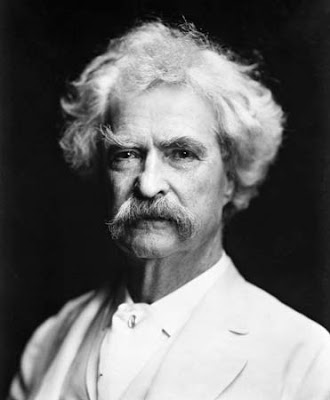 The list of St. Louis "firsts" and items of national cultural significance is a long one, even if you leave out the endless "first ____ west of the Mississippi" claims. St. Louis is an old city by American standards and has been witness to everything from the first structural steel bridge (and first crossing of the Mississippi River), to a raucous welcome home celebration for Charles Lindbergh. The Blues flourished here, Ulysses S. Grant lived here, Mark Twain is very nearly a native son… In fact, it's Mark Twain that got me thinking about our unclaimed heritage.
The list of St. Louis "firsts" and items of national cultural significance is a long one, even if you leave out the endless "first ____ west of the Mississippi" claims. St. Louis is an old city by American standards and has been witness to everything from the first structural steel bridge (and first crossing of the Mississippi River), to a raucous welcome home celebration for Charles Lindbergh. The Blues flourished here, Ulysses S. Grant lived here, Mark Twain is very nearly a native son… In fact, it's Mark Twain that got me thinking about our unclaimed heritage.
Tiny Elmira College in upstate New York is home to the Center for Mark Twain Studies. It's not without reason, Twain spent years in Elmira, wrote many of his works and raised a family there. So as the autobiography of Mark Twain was released earlier this month, it was Elmira College in the spotlight. Researchers appeared on TV, were interviewed on NPR and were quoted in dozens of articles. The Center was established in 1982 at Elmira. Why not at the University of Missouri-St. Louis, why not Truman State, why not St. Louis University or Washington University?
There's a budding effort underway to assemble a Ulysses S. Grant Presidential Library here in St. Louis, potentially at Grant's Farm. None currently exists and his papers remain scattered across the country (Presidential libraries did not become the norm until the mid-20th Century). A St. Louis Blues Hall of Fame (the music, not the hockey team) is coming to Washington Avenue. It will be a welcome addition as our city's musical heritage seems woefully neglected. A great transportation museum exists as a St. Louis County Park, yet, in this state it fails to fully highlight the central role played by St. Louis in our nation's transportation history.

{the Eads Bridge under construction}
Some good ideas are in the works, some effort to claim or reclaim our city's and region's cultural identity. But what else should St. Louis "own"? As the epicenter of the physical and legal fight against slavery, why isn't the primary museum regarding slavery here? The National Underground Railroad Freedom Center in Cincinnati focuses largely on one aspect of our nation's slavery history, the Underground Railroad, and of course addresses larger issues of slavery as well. But wouldn't it be better placed in St. Louis? And Missouri was the site of 27 Civil War battles, fewer only than Virginia and Tennessee, but who would know? We even seem to give Dred Scott short shrift.
What about a significant freshwater ecology center? The largest freshwater aquarium in the world? There's an incredible history to be told of our nation's water and river systems, and managing our ecology and the environment will likely become an ever more prominent mission in the coming century and beyond. This could be a national draw, a significant center of research, and relevant to the region.
Clearly there are already fragments of some of the items mentioned above. That's the point. How does St. Louis go from having a U.S. Grant National Historic Site, to be the national center for U.S. Grant research? How do we go beyond being an obviously place to study freshwater ecology, to being the leader in research and providing a clear visual image of that dominance? Without reaching for the gimmick, or inventing something of dubious value (say, a Provel cheese museum), what else should St. Louis reclaim?

